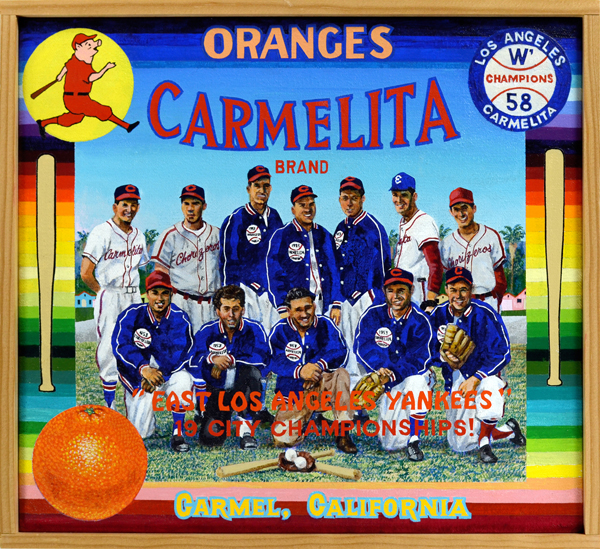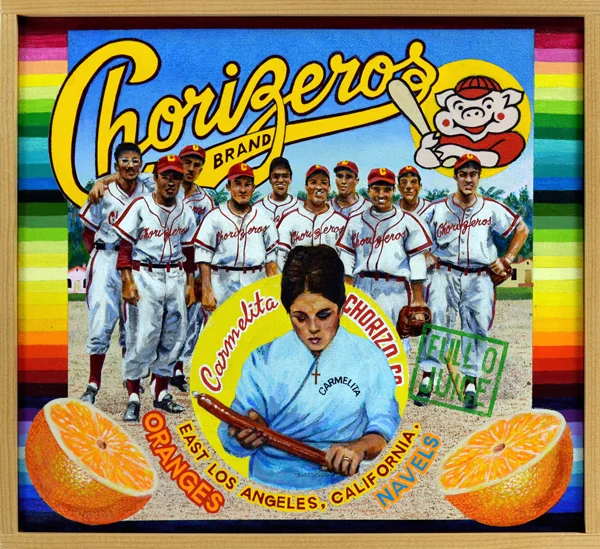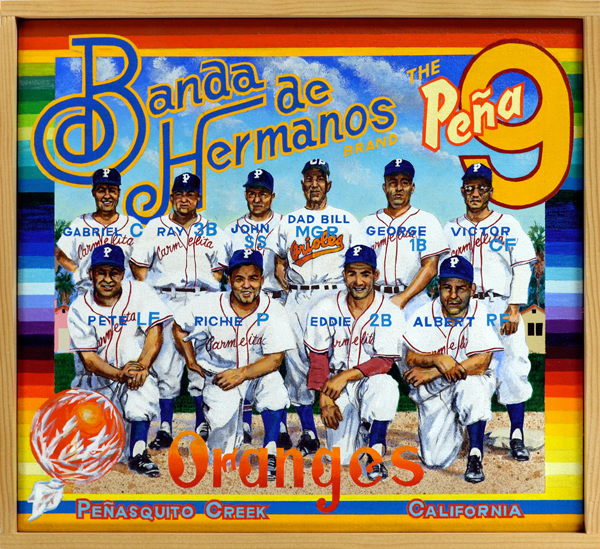•los chorizeros
Text written by Albert Kilchesty

Carmelita Brand
Although there are no official records to support it, no one yet has stepped forward to dispute the claim that the Carmelita Chorizeros won 19 City of Los Angeles Championships during the team’s heyday in the 1950s and ’60s. Their dynastic rule over the dusty diamonds of the city led some to call them the East Los Angeles Yankees. Carmelita teams didn’t discriminate when it came to winning; they beat many barrio nines, of course, in addition to teams made up of African Americans, Japanese Americans and a melting pot of others. The team founder, Mario Lopez, Sr., is pictured at front center. Central to the team’s success was manager Shorty Perez (not pictured), the barrio’s John McGraw, who piloted the club for more than twenty-five years (1947‒1981). A memorial plaque commemorating Perez’s role as local icon may be found at Belvedere Park, site of many Chorizeros victories, in East Los Angeles. ¡Viva beisbol y chorizo!

Chorizeros Brand
Of the many amateur and semi-professional baseball teams composed of Mexican American players from East Los Angeles, none was more successful than the Carmelita Chorizeros, perennial City of Los Angeles champions. The team was sponsored by the Carmelita Provision Company, a manufacturer of pork products such as chorizo—sausage. The Carmelita club was the brainchild of former garage owner and shortstop Mario Lopez, founder of the business, and Francisco “Pancho” Sornoso. From the late 1940s to the early 1970s, The Chorizeros (Sausage Makers) systematically ran opponents roughshod in weekly Sunday contests played under the aegis of the LA Department of Parks and Recreation. Enormous crowds gathered in a festive atmosphere to watch the team, while using the occasion to discuss social and political issues faced by Mexican Americans. These games fulfilled a critical function within the community, uniting it during a time when racial discrimination punctuated by violence threatened to destroy it.

Banda de Hermanos Brand
Major League Baseball may have featured the three Alou brothers at one time, but it can’t boast of an entire team composed of brothers, nine of ‘em to be exact. Ten, if one counts the manager, William Pena (center), father to each young man on this team. The celebrated Pena brothers—Gabriel, Ray, John, George, Victor, Pete, Richie, Eddie and Albert—played for the Carmelita Chorizeros in East L.A. during the 1950s, leading the team to several championships. Their barrio ball feats gained national attention when Ripley’s Believe It or Not published an account of the lads. This band of brothers owes more of its success, however, to the one family member not seen in this painting—Victoria, their mother, whose unconditional love of family and baseball kept the Pena’s happy and fit.
